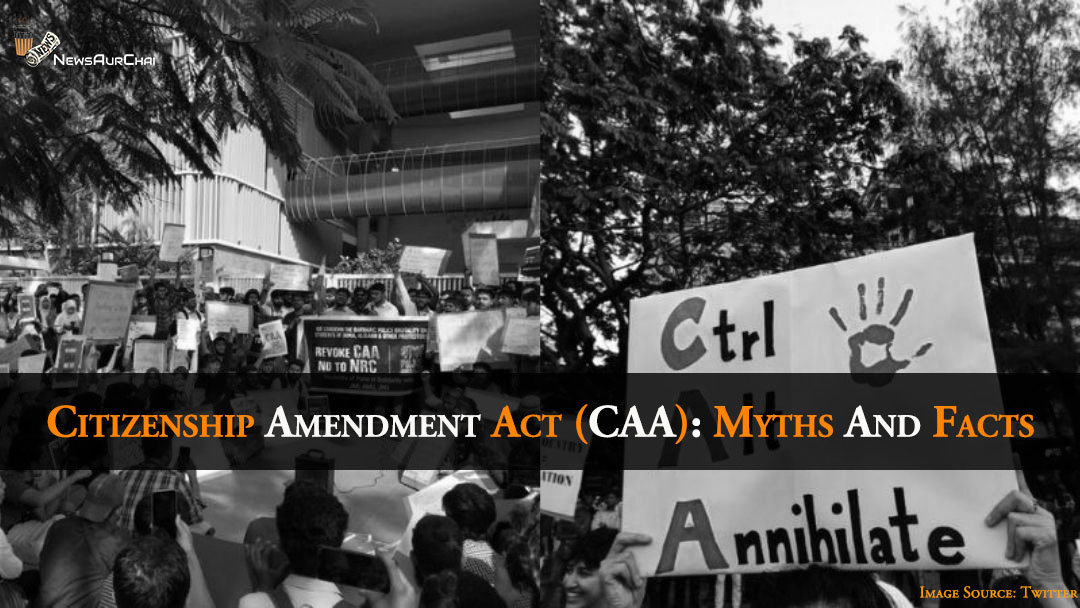
After the Citizenship Amendment Act was passed, opposition parties and people have made this situation worse by spreading propaganda against it. Most clashes against the CAA are because of the lack of understanding of the proposed amendment to the citizenship law. Here are some of the accusations made about the CAA and the respective facts.
Myth: Citizenship Amendment Act (CAA) is against the interest of indigenous people of Assam
Fact: CAA applies to the whole nation; it is not against the National Register of Citizens (NRC), which is being updated to protect the indigenous communities from illegal immigrants
Myth: Citizenship Amendment Act (CAA) weakens Assam Accord
Fact: The Act does not undermine the sanctity of the Assam Accord as far as the cut-off date of March 24, 1971, specified for detention or deportation of illegal immigrants is concerned.
Myth: People in the Northeast are opposing CAA because it is discriminatory.
Fact: Although the statement is true that people in the Northeastern region, particularly in Assam, are protesting against CAA, the reason stated by them is entirely different from other areas.
Natives of the Northeastern region are opposing as they don’t want illegal immigrants from Bangladesh or any other place to be given citizenship–irrespective of their religion. On the other side, the rest of the nation is protesting due to the exclusion of the Muslim community from the Act.
Myth: Citizenship Act will violate the provision of Article 371.
Fact: Article 371 is a part of the Constitution of India. The main objectives of Article 371 were to granting special provisions to some states as to meet the unique needs of the backward regions of these states, preserve the economic and cultural interests of these regions, contend the local challenges and protect the prevailing laws in these regions.
However, CAA won’t violate any provision of Article 371. The linguistic, cultural and social identity of the Northeastern region would be protected.
Myth: Provision of CAA will apply to the tribal areas of the Northeastern region.
Fact: Provision of the amendments to the Act would not apply to the tribal areas of Assam, Meghalaya, Mizoram and Tripura as included in 6th Schedule to the Constitution.
The Sixth Schedule of the Constitution deals with the administration of the tribal areas in the four Northeastern states– Assam, Meghalaya, Tripura and Mizoram as per Article 244–(“Administration of Scheduled Areas and Tribal Areas” (1) The provisions of the Fifth Schedule shall apply to the administration and control of the Scheduled Areas and Scheduled Tribes in any State other than the States of Assam Meghalaya, Tripura and Mizoram). The Governor is authorised to increase or decrease the areas or change the names of the independent districts.
Myth: CAA will trigger fresh migrants belonging to Hindu community from Bangladesh.
Fact: The scale of atrocities on minorities in Bangladesh declined steeply in recent years; thus, the migration of such minorities is right now a remote possibility. Furthermore, the benefits mentioned in CAA will not be available for people of such religious minorities who migrate to India after the said cut-off date of December 31, 2014.
Myth: Citizenship Amendment Act is against Indian Muslims; documents need to be shown to continue living in the country.
Fact: As clearly mentioned by Amit Shah, that Act has nothing to do with Indian Muslims, their citizenship wouldn’t be taken away, or they won’t be detained and deported.
The Citizenship (Amendment) Act, 2019, passed by legislation, amends the Citizenship Act of 1955 by granting Indian citizenship for religious minorities of — Hindu, Jain, Buddhist, Sikhs, Parsi or Christian communities from the predominantly Muslim countries of Pakistan, Bangladesh and Afghanistan who have been living under persecution. For those already residing in India, they will be able to apply for citizenship as well.
Myth: Muslims from these three countries can’t apply for citizenship or refuge in India.
Fact: Although CAA has exempted Muslims from the said three countries, it does not mean that the door for Muslims is entirely shut. Although they are not given blanket relaxation to apply for citizenship under CAA, the usual naturalisation law remains available to them.
Myth: Illegal Muslim immigrants residing in India will be deported after CAA is passed
Fact: As per CAA, citizenship will be given to people of six communities from three countries residing in India, but it does not administer with the deportation of illegal immigrants. Although it protects the about said communities who had entered India illegally from deportation by allowing applying for citizenship, it does not say anything about deportation as that is the subject matter of another law, the Foreigners Act. The process of deporting anyone entering and living illegally in India is ongoing, and the CAA does not change that.
Myth: Why Shias, Ahmadiyyas, Balochs and Rohingyas are not included in CAA, if it is based on religious persecution?
Fact: All these groups come under the Muslim community; they are not recognised as separate religions. As Muslims, they are not minorities in the said three countries, which are either officially Islamic countries or a Muslim majority country. Therefore, it is not possible to include Muslims in the bill as it is made explicitly for religious minorities in those countries. However, if any Muslims are being persecuted in these countries, they can apply for asylum in India. India has already provided refuge to Tibetans, as well as to a large number of people from Afghanistan, Sri Lanka, Uganda and many more.
As many myths and assumptions pop up, we Indians need to understand before we act. We need to check, re-check and verify the sources, and then act in a democratic manner.





